It’s a sure hit, when you follow the tip of Romano De Feo, Antonia Klugmann's partner and a great expert of wines from Collio, and beyond: «A good place for lunch tomorrow? Go to Aleks Klinec!». So we go to Medana, only eight kilometres from Argine a Vencò but already in Slovenia, if only by a few metres. The village is minuscule, little over 200 inhabitants (it’s a fraction of Brda), but there are two interesting places named “Klinec”, so you need to pay extra attention not to make mistakes. The first you meet coming from Italy, on the right, is that of Uroš Klinec, Aleks’s brother: we’re still in Plešivo, a hamlet on the border. There’s a large panoramic terrace where you can taste the excellent home-made prosciutto. Indeed Uroš makes some great cured meat and the restaurant – his wife Nejka takes care of the hospitality – is strongly meat-based. The building also holds a promising b&b with swimming pool (Plešivo 51a, 5212 - Dobrovo. Tel. +386 31 339463)
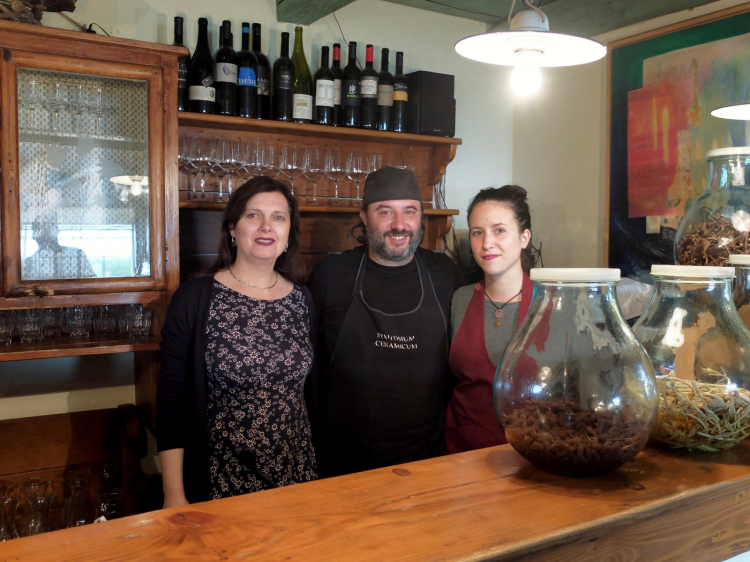
Simona and Aleks Klinec with their daughter Nika (photo by Tanio Liotta)
We’ll go there some other time, as we’re headed to
Aleks’s a little beyond, in Medana, on the left. His tavern,
Klinec,is a gourmet destination – we find there
Gianni Mura with other foodlovers – both for the food and the excellent macerated, biodinamic
maison wines.
Aleks, born in 1967, is the cook. He’s such a big man you wouldn’t think he’s the author of the dishes: not only are they very delicious but they’re also excellently made, gracious, with an unexpected attention for aesthetics. His wife
Simona makes us sit at the table, outside, also on a nice terrace overlooking the vineyards, but on the opposite side, compared to
Uroš Klinec (here there’s Medana, there, Plešivo).
The menu is essential, presenting local specialities, but in a more elegant way and based on local raw materials from this rural area: «We try to use everything this land has to offer: we grow our own vegetables and herbs, while our farmer friends sell us lamb, capon, geese, goats, when they’re not our own». The pairing is of course with
Klinec wines, as we’ll see.
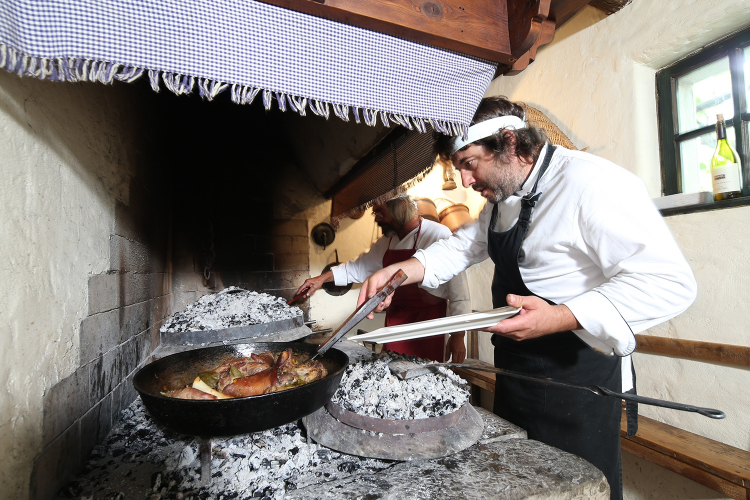
Aleks at work by the older stove (there’s a newer one too)
learnt to cook from his grandmother
Ida, «she was a cook for a noble family in Palermo». Once back to Slovenia, she didn’t forget what she learnt on the island, «she would make in turn both dishes from Sicily and local ones. Plus my uncle would bring eel, freshwater fish, crayfish, frogs, snails…». A triumph of delicacies in which the grandson grew up, and which today he honours as much as possible.
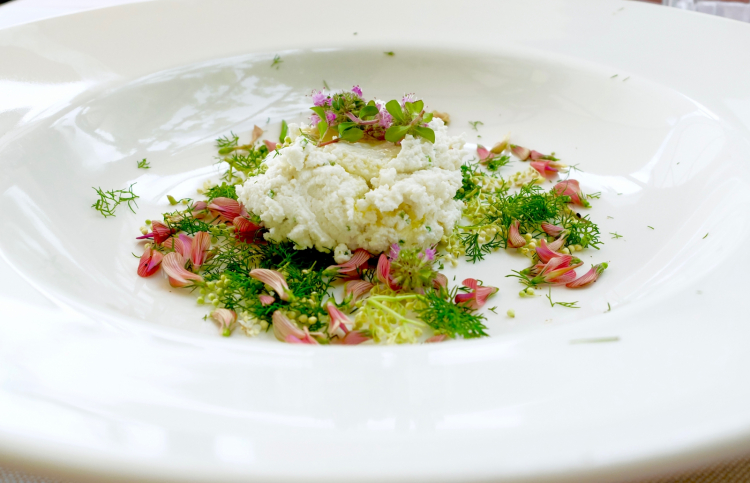
Ricotta, flowers and herbs. Tanio Liotta took the photos of the dishes
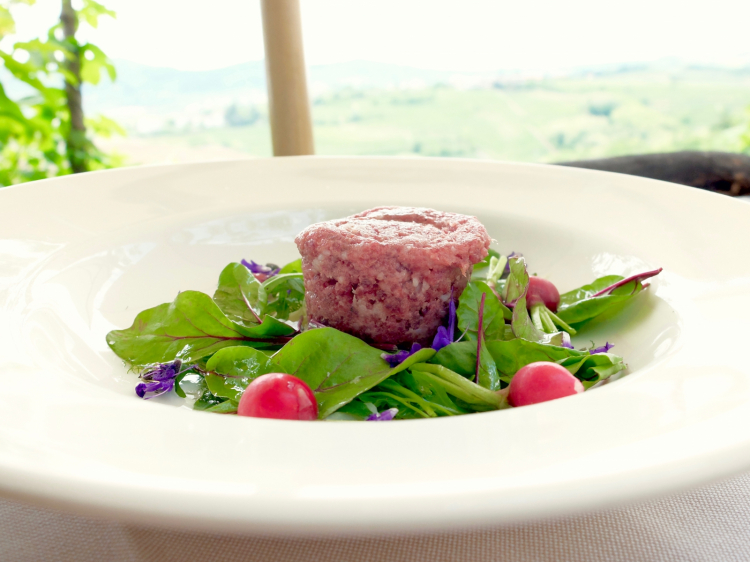
Mangalitza pork tartare with radishes and red bean leaves
You can taste some charming olive oil, of course produced form
belica/bianchera olives – a precious autochthonous variety – and leccino, «this is the extreme north-west border for olive trees» while they serve some very fresh ricotta, from goat and cow’s milk, with herbs and flowers. Lovely. Then there’s the
Pork tartare with radishes and red bean leaves: the meat is from
mangalitza, which is rich, suave. It is matured for 4 months, then minced twice, adding only a little lard. It’s a blast for the palate. We continue with a nice
Barley with asparagus and prosciutto, then
Pasta with capon and Baked lamb, super delicious. As for desserts, strudel and panna cotta.
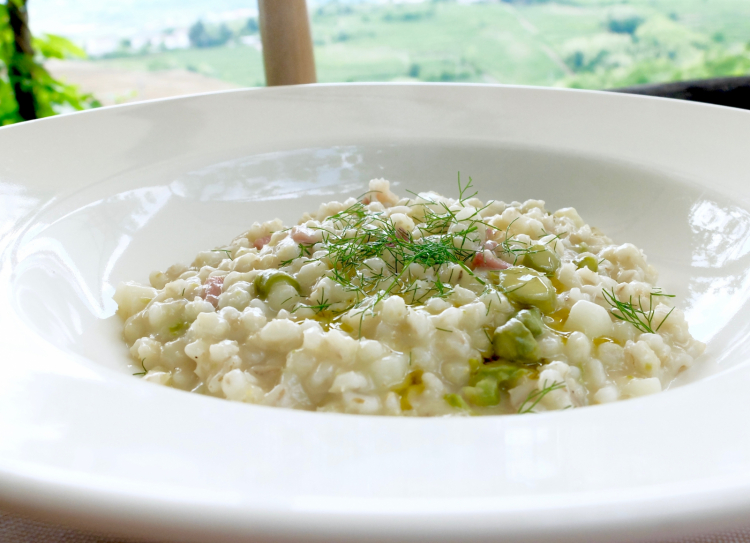
Barley with asparagus and prosciutto
All this, as we mentioned, paired with
Klinec wines. Aleks says: «At our farm we do sustainable agriculture and we run our vineyards according to biodynamics. We have nine plots in Medana, at an altitude that varies from 150 to 180 metres, a total of some six hectares», plus another half hectare recently acquired. Total production is some 20000 bottles, precious ones: «We only use grapes from our vineyards, hand picked in 20 kg baskets and destemmed before maceration in cement tanks. After a few days of maceration, the grapes are pressed and the wines are transferred into acacia, mulberry, wild cherry and oak wood barrels, where they complete the malolactic fermentation and stay on the lees from two to three years».
A few months before bottling, the wines are moved into stainless steel tanks, in which they decant so as to become limpid. Only then they add a little sulphur to protect the wine from oxidation. They bottle without filtering and with a minimal quantity of added sulphites. This results in excellent nectars: Ribolla, Malvasia, Tocai, Pinot Grigio, Verduzzo, and then red wines like Merlot, Cabernet Franc, as well as some blends, «but I also want to make Schioppettino now».
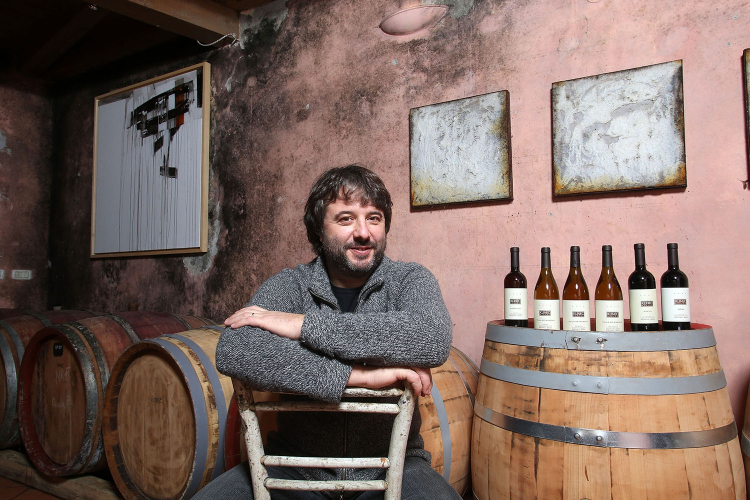
Aleks Klinec and his wines
The family farm will be one hundred years old next year, «it was born in 1918 thanks to my great-grandfather», so this is the fourth generation. Cultivating vines and making wine, however, is an activity that
Aleks only recuperated lately: «In the days of the
Iron Curtain, we mostly had orchards. Our apricots, peaches, plums and cherries did very well at the market in Ljubljana. They were always sold out because it would take us only a day to get into town, so they were picked when they were perfectly mature. Others instead came from Bosnia or Serbia: transport was much slower so they weren’t as sweet and as popular».
Indeed, vine growing recuperates a tradition that goes back into the centuries. The first documents date back to 610 AD, «the land of Collio Goriziano (in Slovenian it’s called Goriška Brda) is mostly made of Eocene rocks called
flysch. They’re very rich in marine fossils such as Assilina medanica, named after Medana, our very village. Sun exposure and atmospheric agents make
flysch decompose quickly, transforming it into fertile soil, rich in minerals and with good draining, while the subsoil preserves the thick original stratification and guarantees a precious reserve of humidity thanks to its low permeability». Then there’s the barrier made by the Alps and the sea close by (only 15 km) mitigating the climate, «sun irradiation reaches 2900 hours per year, on average. For centuries, the
Brici people – this is our name in Slovenian – have been planting and cultivating vines on the hills, preventing erosion by creating terraces».
The chat ends in front of a selection of aromatised grappa, by the same winery, of course: which one is better, with mulberries, butcher’s broom, achillea, spinach, peach, rocket salad or linden?
Translated into English by Slawka G. Scarso
Aleks & Simona Klinec
Medana 20, 5212 Dobrovo V Brdih, Slovenia
Tel. +386 40 663322
www.klinec.si